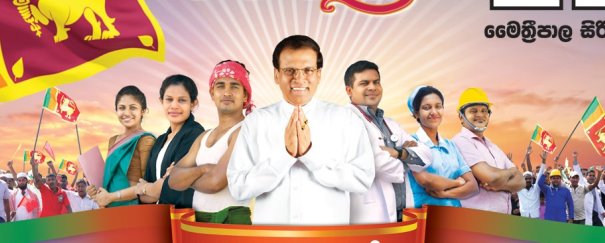Rajapaksa has failed in post-war reconciliation, Tamils feel. However, many of them don’t see this as ‘their election’ and can’t see how their lives will change after the polls
After Sri Lanka’s brutal war ended five years ago, President Mahinda Rajapaksa gave the Tamil majority North better roads, rail connections and electricity. However, people of the Northern Province believe he has not given anything by way of the much-awaited post-war reconciliation that will make them vote for him.
Despite trying hard to recover from the trauma of the war, the island’s Northern Tamils are constantly weighed down by concerns over heavy militarisation, land grab by the army and the absence of livelihood opportunities that could potentially revitalise the economy in the former war zone.
Over 7 lakh voters
The Northern Province — spanning Jaffna, Kilinochchi, Mullaitivu, Mannar and Vavuniya districts — has over 7 lakh voters and with a close contest likely on January 8, votes of the minority Tamils and Muslims could make a difference.
The three decade-long war and its end have meant different things to different Sri Lankans depending on whether they are in the country’s North or South. Mr. Rajapaksa’s support base among southern Sinhalese will vote for him because he ended the war, crushing the rebel Tigers. For the Northern Tamils, the primary reason to vote against him is that though the war ended five years ago, peace hasn’t really begun. President Rajapaksa, to them, personifies the failure in reconstruction.
Also, Mr. Rajapaksa gave no effective political signal to the Tamils after the war ended in May 2009, observes Veeragathy Thanabalasingham, editor of Colombo-based Thinakkural newspaper. “It is not just about the war. Tamils see Mr. Rajapaksa as being fundamentally opposed to the minorities.”
President Rajapaksa had at least two occasions to reach out to the Tamils. One in May 2009 and another in September 2013. “After the war ended he could have initiated genuine reconciliation, but he didn’t. Later, when the Northern Provincial Council was formed he could have let it function, but he didn’t do that either,” Mr. Thanabalasingham said. Having missed both opportunities, the President effectively alienated the Tamils.
While there is an apparent anti-Rajapaksa sentiment pervading the North, there is no major wave in favour of the opposition candidate, unlike in 1994 when former President Chandrika Bandaranaike Kumaratunga contested, explains Devanayagam Premanand, executive editor of the Jaffna-based Uthayan.
Pro-Sirisena vote?
Northern Tamils don’t see Maithripala Sririsena as being very different from President Mahinda Rajapaksa. “Both were after all in the same party, working together during the war. However, the Tamils are determined to unseat Mr. Rajapaksa and that is why they will vote for Mr. Sirisena,” he said.
Concurring with the view, People’s Liberation Organisation of Tamil Eelam (PLOTE) leader and Tamil National Alliance (TNA) member D. Sithadthan says: “It [Tamil vote] will very much be an anti-Mahinda vote, but cannot be perceived as necessarily a pro-Sirisena vote.”
Also, sections among Tamils feel this election is not really “their election”, says Mr. Premanand, despite the TNA deciding to pledge support to Mr. Sirisena. “People can’t see how their lives will change post-elections.”
Moreover, neither of the candidates has spoken about the Tamils’ long-pending demand for devolution or implementation of the 13th Amendment to the Constitution that speaks of it, perhaps fearing hostility from their Sinhala electorates. Many Tamils appear to have already lowered their expectations from the government that would take charge post-elections.
In the 2005 presidential polls, large sections of Tamils did not vote since the LTTE enforced an election boycott, reportedly enabling a narrow victory for Mr. Rajapaksa against UNP leader and former Prime Minister Ranil Wickramasinghe .
In 2010, the Tamils decided to support former army commander Sarath Fonseka — now part of the joint opposition camp — against President Rajapaksa who they have been accusing of war crimes. That Mr. Fonseka was commanding the army when the LTTE was defeated did not come in the way of their anti-Rajapaksa position.
This time, having lost all faith in President Rajapaksa — after observing his performance over 10 years as TNA leader R. Sampanthan remarked while declaring election stance — the Alliance has chosen to endorse Mr. Sirisena, hoping that his victory would open up democratic space in the country and set the stage for negotiations.
Endorsing the view, Northern Chief Minister C.V. Wigneswaran said in a statement: “a vote against the [Rajapaksa] regime is a vote for democracy.” He added that it would be harder for the common candidate to continue suppressing the Tamils’ rights, considering that a diverse coalition, including minority Muslims, backs him.
Addressing a recent campaign rally in Jaffna, President Rajapaksa urged Tamils to vote for him, a “known devil” rather than this chief rival Mr. Sirisena, who he referred to as an “unknown angel.” It is not difficult to guess which of these the Tamils will choose
The Hindu
